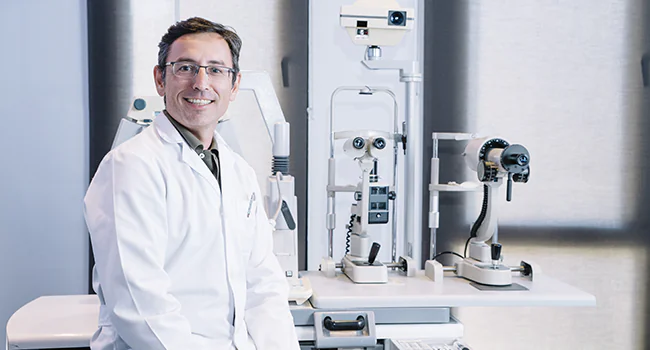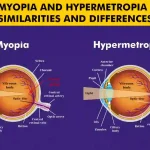Summary: Knowing the difference between an optometrist and an ophthalmologist ensures timely and effective eye care. Routine exams with an optometrist help detect early vision changes, while ophthalmologists provide advanced treatments and surgeries to safeguard your eyes and preserve long-term visual health.
|
Key Takeaways:
|
Optometrists and ophthalmologists are both eye care professionals, but their roles, qualifications, and scope of practice differ significantly. While an optometrist primarily focuses on vision care and prescribing corrective lenses, an ophthalmologist is a medical doctor who specialises in diagnosing and treating eye diseases, performing surgeries, and providing comprehensive eye care.
Who is an Optometrist?
An optometrist is a healthcare professional trained to examine eyes for vision problems, prescribe glasses or contact lenses, and detect common eye conditions. What does an optometrist do? They conduct comprehensive eye exams, manage conditions like dry eyes or minor infections, and can offer vision therapy. However, optometrists typically do not perform major surgeries.
Who is an Ophthalmologist?
An ophthalmologist is a medical doctor specializing in eye care. What does an ophthalmologist do? They diagnose and treat all eye diseases, perform eye surgeries such as cataract removal, and prescribe medications for complex conditions, including glaucoma and retinal disorders. Ophthalmologists undergo extensive medical training, including a residency, which enables them to manage both routine and specialised eye care.
Key Differences Between an Optometrist and an Ophthalmologist
The fundamental difference between optometrists and ophthalmologists lies in their level of education, training, and the services they provide. While both professionals contribute to eye care, their expertise and the scope of their practice vary significantly.
|
Aspect |
Optometrist |
Ophthalmologist |
|
Education |
Bachelor’s + Doctor of Optometry (OD) |
Bachelor’s + MBBS + MD/MS in Ophthalmology |
|
Training Duration |
4-6 years |
8-12 years |
|
Scope of Practice |
Eye exams, vision correction, basic eye disease management |
Diagnosis, treatment, surgery, and complex eye disease management |
|
Can Perform Surgery? |
No |
Yes |
|
Can Prescribe Medications? |
Limited to basic eye conditions |
Full medical prescription rights |
|
Commonly Treats |
Refractive errors, dry eyes, minor infections |
Glaucoma, cataracts, retinal disorders, eye trauma |
Education & Training
Optometrists:
To become an optometrist, a candidate must:
- Complete a Bachelor’s degree in Science or Pre-Medical Studies (3-4 years).
- Enroll in a Doctor of Optometry (OD) program, which lasts 4 years and covers topics like:
- Ocular anatomy and physiology
- Optics and refraction
- Clinical diagnosis of vision issues
- Contact lens fitting and prescription
- Essential management of eye conditions like dry eye and allergies
- Some optometrists undergo additional residency training (1 year) in specialised areas such as pediatric optometry or ocular disease.
Ophthalmologists:
To become an ophthalmologist, an individual must:
- Earn a Bachelor’s degree in a science-related field (3-4 years).
- Complete an MBBS degree (5-6 years), providing medical knowledge and general medicine training.
- Pursue a postgraduate specialisation (MD/MS in Ophthalmology) (3 years) covering:
- Advanced ocular disease diagnosis and treatment
- Eye surgeries (LASIK, cataract surgery, retinal surgeries, corneal transplants)
- Pharmacological treatments for various eye conditions
- Some ophthalmologists opt for fellowships (1-2 years) in specialised fields like retina surgery, glaucoma treatment, or corneal disorders.
Scope of Practice
What does an optometrist do?
Optometrists play a crucial role in eye health management by:
- Conducting comprehensive eye exams to assess vision and eye health.
- Prescribing glasses and contact lenses based on vision needs.
- Detecting and managing refractive errors (myopia, hyperopia, astigmatism, presbyopia).
- Providing vision therapy for binocular vision problems.
- Managing minor eye conditions like dry eyes, allergies, and mild infections.
- Referring patients to ophthalmologists when advanced medical or surgical intervention is required.
What does an ophthalmologist do?
Ophthalmologists provide comprehensive eye care, including:
- Diagnosing and treating severe eye conditions like Glaucoma, cataracts, and diabetic retinopathy.
- Performing eye surgeries, including:
- LASIK and PRK for vision correction
- Cataract removal and intraocular lens implantation
- Retinal detachment repair
- Corneal transplants
- Prescribing medications for a wide range of eye diseases.
- Handling eye emergencies such as trauma, chemical burns, and severe infections.
Common Conditions Treated
Optometrists treat:
Optometrists focus on vision correction and essential eye health management. Common conditions they treat include:
- Refractive errors (nearsightedness, farsightedness, astigmatism)
- Presbyopia (age-related difficulty in reading)
- Dry eye syndrome (insufficient tear production)
- Allergic conjunctivitis (eye allergies and irritation)
- Minor infections like bacterial conjunctivitis
Ophthalmologists treat:
Ophthalmologists handle complex medical and surgical eye conditions, including:
- Cataracts (clouding of the eye’s lens requiring surgical removal)
- Glaucoma (optic nerve damage leading to vision loss)
- Diabetic retinopathy (diabetes-related damage to retinal blood vessels)
- Macular degeneration (age-related loss of central vision)
- Retinal detachment (a medical emergency requiring immediate surgical intervention)
Can Optometrists Prescribe Medicine in India?
A frequently asked question is whether optometrists can prescribe medicine in India. The answer is partially yes.
- Optometrists in India can prescribe topical medications, such as eye drops for dry eye, allergies, and infections.
- They cannot prescribe oral medications or controlled substances.
- Only ophthalmologists can prescribe high-risk drugs, perform surgeries, and manage complex diseases.
When to See an Optometrist vs an Ophthalmologist?
It is essential to understand when to visit an optometrist vs an ophthalmologist:
- See an optometrist if you:
- Need a routine eye exam or a new prescription for glasses or contacts.
- Have mild vision problems, such as blurry vision or eye strain.
- Need contact lens fitting or vision therapy.
See an ophthalmologist if you:
- Experience sudden vision changes, flashes, or floaters.
- Have eye pain, severe redness, or persistent irritation.
- Require surgical intervention for cataracts, Glaucoma, or retinal issues.
- Have chronic or progressive eye diseases like macular degeneration.
Choosing the Right Specialist
When selecting between an optometrist and an ophthalmologist, consider:
- Nature of your eye problem – Routine vision care vs. medical or surgical treatment.
- Expertise required – Optometrists handle primary eye care, while ophthalmologists treat complex cases.
- Referral system – Optometrists refer patients to ophthalmologists when needed.
FAQs
Who is an ophthalmologist?
An ophthalmologist is a medical doctor specialising in diagnosing, treating, and managing eye diseases. They can perform surgeries, prescribe medications, and provide eye care services.
What is the meaning of ophthalmologist?
An ophthalmologist is a medical doctor specializing in the care of the eyes. They diagnose and treat eye diseases, prescribe medications, and perform surgeries to maintain or restore vision.
Who is an optometrist?
An optometrist is a healthcare professional trained to examine, diagnose, and correct vision problems using glasses, contact lenses, and essential treatments for minor eye conditions.
What is an optometrist?
An optometrist is a healthcare professional who performs eye exams, prescribes corrective lenses, and manages common eye conditions; however, they typically do not perform major surgeries.
What is an ophthalmologist and an optometrist?
The main difference is that an ophthalmologist is a medical doctor who can perform surgeries and treat complex eye diseases, whereas an optometrist focuses on routine eye care, vision correction, and essential eye health management.
Can an optometrist prescribe medicines in India?
Optometrists in India can prescribe topical medications like eye drops for mild conditions but cannot prescribe oral drugs or controlled substances. Only ophthalmologists have full prescribing rights.
What does an ophthalmologist do that an optometrist cannot?
Ophthalmologists diagnose and treat severe eye conditions, perform surgeries like cataract removal and LASIK, and prescribe advanced medications that optometrists are not authorised to provide.





